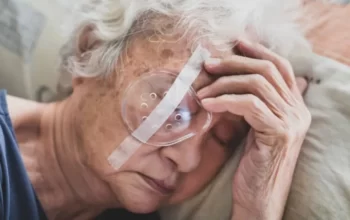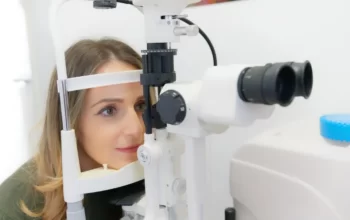
During an eye exam, pupil dilation is done to intentionally make the pupils bigger so that the eye doctor can thoroughly inspect the health of the optic nerve and retina. The examination is essential for identifying and treating eye conditions that might impair vision.
During an eye exam, pupil dilation is used to purposefully enlarge the pupils. Your eye’s pupil will dilate, allowing more light to enter.
An eye doctor can learn important information from both dilated and undilated eye exams. Let’s first examine the undilated exam.
What is Eye Dilation?
When conducting an eye exam, an ophthalmologist or optometrist frequently dilates the patient’s pupils.
An ophthalmologist or optometrist will place dilating eye drops into a patient’s eyes during dilation to cause the patient’s pupils to enlarge. Pupils will fully open up and spread out when this occurs.
The way that dilating eye drops affect each person’s eyes varies slightly. Green, blue, or hazel eyes are more likely to dilate more quickly than eyes of a different color.
However, in most cases, after applying dilating eye drops to your eyes, your pupils will start to widen 15 to 30 minutes later. Your eye exam won’t begin until your eyes have fully dilated, so be patient with your ophthalmologist or optometrist.

How Long Does It Last?
The dilation drops have a different effect on everyone’s eyes. Your pupils typically don’t fully open for 15 to 30 minutes. Within 4 to 6 hours, the majority of people are back to normal. However, for you, the effects might be more pronounced or might last a lot longer.
Benefit of Having Your Eyes Dilated
According to a Mayo Clinic article, dilation of the pupils enables your optometrist to have a clearer view of the back of your eye, which may enable the diagnosis of some conditions, even in their early stages. This is especially useful for eye diseases and conditions. Some conditions your Jewell Eye optometrist may be able to diagnose after dilating your eyes include:
- Hypertension or high blood pressure
- Diabetes or Diabetic retinopathy
- Glaucoma
- Retinal detachment
- Macular degeneration
After dilating your eyes, the optometrist may find additional eye-related conditions and diseases.
Importance of Eye Dilation
Your pupil enlarges as the drops are inserted into your eyes, allowing more light to enter the eye. This enables the optometrist to see the tissues at the back of the eye more clearly and identify any diseases, wounds, or other conditions that may be affecting the macula, optic nerve, or retina.
The National Eye Institute (NEI) emphasizes the significance of dilation during your thorough eye examination. While you might assume your eyes are in good shape, the only way to be certain is to get a thorough eye exam that includes dilating your pupils.
Many eye illnesses and other conditions that affect the eyes have minimal to no early symptoms. When you undergo an eye examination that involves dilation, your Jewell Eye Inc. optometrist to diagnose issues potentially affecting your eye health.
Can I Drive?
Unless you are farsighted and don’t wear glasses to correct your vision, dilation usually doesn’t affect your ability to see far away. The glare outside might annoy you, though, because your pupils are powerless to control how much light enters your eyes. Driving becomes risky for some people as a result.
Request a ride from a friend or family member if you’ve never had your eyes dilated. You won’t know if dilation prevents you from driving after an exam until you’ve had it done.
Bring sunglasses so you can protect your eyes after the exam, whether or not you get behind the wheel.
Can I Go Back to Work?
Your eyes have a difficult time focusing on things that are close to you when you are wearing dilating drops. After your appointment, unless you wear bifocals or use reading glasses, you probably won’t be able to read, use the computer, or perform other tasks that call for near vision. The bright light might annoy you if you work outside. To avoid having to report back to work, it might be simpler to schedule a later appointment.
How Often Do I Need It?
Every person over 60 should get a dilated eye exam once a year, according to the National Eye Institute. The yearly recommendation begins at age 40 because African-Americans have a higher risk of developing glaucoma. No matter your age, you should get a dilated exam if you have diabetes once a year.
For those who use glasses or contacts, dilation is frequently a standard component of an eye exam. You might not require it every time if you’re young and in good eye health. Without dilation of your pupils, your doctor may also be able to examine your retina using other techniques, but these may not be as accurate. See what your doctor recommends.
With aging, many eye conditions become more prevalent. Everyone should receive a baseline exam with dilation when they turn 40, according to the American Academy of Ophthalmology. Your doctor will be able to keep an eye out for any changes that might be an issue.
Why You Should Have Eye Dilation Done If You’re over 60
As you get older, you automatically have a higher chance of developing a wide range of eye conditions. The only way to stop those eye conditions from causing serious harm to your eyes is to identify and treat them as soon as you can.
Once you turn 40, you run a significantly higher risk of developing a variety of eye conditions. Your risk level will continue to rise from that point forward, requiring you to take your annual eye exams more seriously than ever.
You should almost always have eye dilation performed during an eye exam by the time you are 60 years old. Every person over 60 years old should receive at least one dilated eye examination a year, according to the National Eye Institute.
The discomfort of having your eyes dilated will be more than worth it in the long run if it enables your ophthalmologist or optometrist to correctly diagnose you with an eye condition.
Why You Should Also Have Dilation Done If You’re a Certain Ethnicity
Comparatively to people of other ethnicities, those from specific ethnic backgrounds are more likely to experience certain eye diseases.
You are more likely than other people to be diagnosed with glaucoma, for instance, if you are African-American or Hispanic. So by the time you’re 40, you should schedule dilated eye exams at least once every one to two years.
It could have disastrous effects on your health if you decide not to participate in dilated eye exams. In fact, glaucoma has recently risen to the top among African-Americans as a cause of vision loss. And a big part of it is because so many African-Americans are blind from glaucoma.
Regularly getting dilated eye exams will allow you to determine whether you should be concerned about it.
How Your Medical History Could Come into Play
Have you ever had diabetes diagnosed? Alternatively, have you ever experienced eye conditions like retinal detachment?
Your ophthalmologist or optometrist will probably recommend that you have dilated eye exams if either of these situations applies to you. You may be more likely to experience additional eye problems in the future based on your medical history.
That’s not to say you shouldn’t get an eye exam every year just because you haven’t had to deal with a health issue like diabetes or an eye condition like a retinal detachment.
But it is important to note that anyone who has a history of eye issues or other health issues should never forego the dilation portion of an eye exam.
How past Eye Exams Could Play a Role in Your Dilation Decision
Let’s say you’ve developed the routine of getting your eyes checked each year for the past ten years. When your eye doctor informed you that you needed to have your eyes dilated for your exam, you didn’t utter a single sound.
But this year, you’re just not in the mood for dilation. On the day of your annual eye exam, you have obligations, and you don’t want to stress about how you’ll manage light sensitivity and blurry vision afterwards.
So, you ask your ophthalmologist or optometrist if they would be willing to let you skip dilation this time around. They check your chart, see that you have been examined every year for the last decade and experienced absolutely no eye problems, and say…
In all honesty, it is up to your eye doctor. Some ophthalmologists and optometrists want to perform eye dilation during every yearly eye exam, without a patient’s consent.
However, if you haven’t consistently displayed eye problems over time, some will also let you off the hook. You are a low-risk patient, so you don’t require as extensive dilation as many other patients do.
You shouldn’t attempt to avoid dilation going forward by using that as justification, though. However, it does imply that, with the approval of your ophthalmologist or optometrist, you might occasionally forgo dilation if you have a clear physical examination and a history of no eye conditions.
When Eye Dilation Might Not Be Necessary at All
Are you planning to visit your eye doctor or optometrist to inquire about receiving a new prescription for your glasses?
If so, this is one of the very few instances when you won’t have to worry about your eyes being dilated at all during your appointment. Since preparation for dilation won’t be necessary, don’t bother.
Eye dilating medication during an eye exam for a prescription may actually impair your vision to the point where your eye doctor is unable to accurately assess your eyes. You’ll notice a difference in how you see, and your ophthalmologist or optometrist won’t be able to write you an accurate prescription.
Additionally, dilating will not be required at any subsequent appointments for prescriptions or eye exams. Asking your eye doctor if dilation might be an option in advance will allow you to make the necessary preparations on your end.
Are There Any Alternatives to Having Your Eyes Dilated?
It’s possible that in the not-too-distant future, eye dilation will no longer be a problem.
There are high-tech devices on the market right now that can perform retinal exams without dilating the pupil, though not all ophthalmologists and optometrists are using them just yet. In just a few seconds, they can take pictures of someone’s retina and leave.
However, these devices are still quite pricey, so it might be some time before you can utilize one during a yearly eye exam.
In the interim, your eye doctor might be able to suggest a different procedure from standard dilation. You might have alternatives if the thought of having dilating eye drops put in your eyes makes you sick to your stomach.
Find out what else your optometrist or ophthalmologist would suggest for you by speaking with them.

Who Should Have a Dilated Eye Exam?
There are several justifications for recommending a dilated eye exam. For instance, if you’re over 60, a yearly dilated eye exam is essential for the early detection of eye disease and for maintaining eye health. The same goes for eye-related diseases like diabetes or glaucoma, which require annual exams to check for any potential progression.
How Often Should You Have It?
The frequency of eye dilating depends on your age and medical history, say experts. People with a history of eye health issues should have it done once a year or every other year.
Within five years of receiving a diabetes diagnosis, type 1 diabetics should have their exam. When they are diagnosed with type 2 diabetes, they should get theirs.
Consult your doctor for medical advice if you are unsure of the timing of your examination. You could get information from them that is relevant to your situation.
Conclusion
Eye dilation is a procedure done by ophthalmologists and optometrists to monitor eye health and identify risk factors.
Inquire with your doctor about how frequently you should have your eyes dilated and what to expect during the procedure.
FAQs
Can I Use My Phone After Eye Dilation?
After eye dilation, you can talk on the phone, but staring at any digital screens may make you uncomfortable until your pupils return to normal. Electronic devices such as phones, tablets, computers, and others emit blue light that can cause digital eye strain.
What Not to Do After Eye Dilation
Stay out of the sun: Direct sunlight can harm your eyes, so you should never look at it. Avoid staring at digital screens; the blue light they emit can cause digital eye strain.
Can You Refuse Eye Dilation
Not doing so might even be regarded as going below the required level of care. No, a provider cannot insist that a patient dilate their pupils, but they can if necessary. The healthcare professional would probably note that the patient declined dilation if they continued to object.
How to Get Your Dilated Pupils Back to Normal
The best course of action is to wait it out and try not to worry because there isn’t really a way to make eye dilation go away more quickly. Make an appointment with your eye doctor if the length of time it is taking for the dilation to pass concerns you.
How to Make Eye Dilation Go Away Faster
Since there isn’t really a way to make eye dilating go away more quickly, it’s best to wait it out and try not to get anxious. Contact your eye doctor if you are concerned about how long the dilation is taking to pass.



